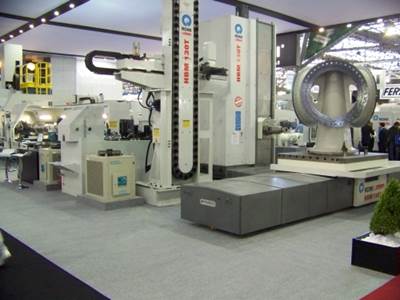Brazil Continues to Look Outward
Machine tool builders at the recent FEIMAFE trade show in Sao Paulo say they continue to eye foreign markets such as the United States. At the moment, though, Brazil’s strong currency makes it tough for them to compete abroad.
Share




Hwacheon Machinery America, Inc.
Featured Content
View More

.png;maxWidth=45)
DMG MORI - Cincinnati
Featured Content
View More



Six years seemed like the right length of time for me to revisit Brazil and attend the FEIMAFE trade show. Over the years, I missed the excellent weather and great food (like Brazilian barbecue and feijoada, which is a tasty stew I was introduced to on this latest trip), but the time away made the changing social, economic and industrial conditions eminently clear.
As in 2005, Modern Machine Shop magazine was honored to be the only U.S. trade publication invited by ABIMAQ, the Brazilian Association of Machines and Equipment Manufacturers, to attend this year’s show (which took place in conjunction with the Qualidade quality control fair). This 13th edition of the biennial event (the largest in its history with 71,800 attendees) was located in bustling Sao Paulo, one of the most populated cities in the world. It’s fitting because that city is also the country’s primary industrial area. However, it’s also a region that’s going through significant changes which, while obviously positive, are generating growing pains for those who live there and companies that produce there.
Over the past decade, the minimum wage in Brazil has risen steadily thanks in part to efforts by its former and current president. As a result, a true middle class has finally emerged. (It’s estimated that between 30 and 40 million Brazilians have been elevated to the middle class over the past decade.) This has caused significant internal demand for consumer goods, from which local manufacturers are benefitting. Similarly, the Brazilian automotive industry is on track to produce a hefty 3.5 million cars this year to satisfy the increased demand.
Unfortunately, though, Brazil’s infrastructure is not mature enough to sufficiently support the rapid growth. During my trip, this was evident in the major traffic jams we encountered when trying to get around Sao Paulo. With the soccer World Cup scheduled in 2014 and the Olympics in 2016, the country has a good deal of work ahead of it to effectively support such huge events, let alone everyday life.
Not surprisingly, the machine tool builders in Brazil find themselves in the midst of opportunities and challenges, too. According to Gardner Publications’ “2011 World Machine Tool Output and Consumption Survey,” Brazil ranks 10th worldwide in machine tool production and 9th in machine tool consumption. The automotive industry remains one of the strongest sectors in terms of machine tool purchases in Brazil. Farming in Brazil is becoming more advanced, too, leading to the adoption of more sophisticated equipment.
That said, the country’s strong currency makes it difficult for Brazilian machine tool builders to competitively export their products. However, ABIMAQ, in conjunction with the Brazilian government, continues to promote the advantages of its country’s machine tool technology throughout the world. This has lead to the development of Brazil Machinery Solutions (BMS), the branding face of a joint project between ABIMAQ and APEX (the Brazilian Agency for Exports and Investments Promotion). The goal of BMS is to improve awareness in key markets (the United States being one of them) so manufacturers realize that Brazil has more to offer than just soccer and Carnaval.
As BMS notes, Brazil is a mix of different cultures with different needs. Similarly, Brazilian machine tool companies strive to deliver equipment solutions to meet their customers’ specific production problems, not just pieces of equipment. This was echoed by machine tool builders at FEIMAFE that realize they must work to tailor their offerings to the needs of foreign companies in order to compete. The technology on display at the event also demonstrated that the Brazilian machine tool builders continue to integrate higher levels of technology and greater capabilities in their designs, too.
I have limited space in this column to describe my trip, so I created an online slideshow that explains more about what I encountered, which included visits to few area machine tool builder facilities: Industrias Romi (Brazil’s largest machine tool builder), Ergomat and Heller. I also got a chance to visit the main campus of SENAI, Brazil’s National Service of Industrial Apprenticeship, which is a non-profit organization created to promote professional development and technological education to young students. Its main facility is impressive, clean and filled with a number of advanced machine tools and other equipment for effective student training.
Read Next
A Taste of Brazil
See what I encountered during my time at the FEIMAFE show in Sao Paulo and visits to area machine tool builders.
Read More5 Rules of Thumb for Buying CNC Machine Tools
Use these tips to carefully plan your machine tool purchases and to avoid regretting your decision later.
Read MoreBuilding Out a Foundation for Student Machinists
Autodesk and Haas have teamed up to produce an introductory course for students that covers the basics of CAD, CAM and CNC while providing them with a portfolio part.
Read More


































.jpg;maxWidth=300;quality=90)
.jpg;maxWidth=300;quality=90)



